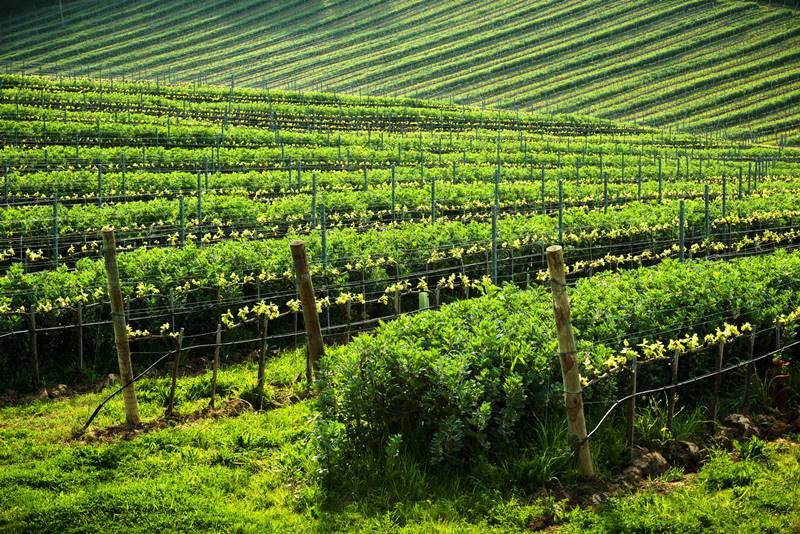In a significant milestone for the British wine industry, the UK now boasts more than 1,000 vineyards, up 9.2% last year. This expansion is reflected in record sales figures, with England and Wales selling 8.8 million bottles of wine in 2023, up 10% on the previous year. The industry’s growth, both in terms of production capacity and market presence, reflects a strong response to growing consumer demand. According to the Food Standards Agency, 87 new vineyards were registered last year, taking the total to 1,030.
Nicola Bates, CEO of WineGB, said that passing the 1,000 vineyard mark was a huge achievement for the sector, highlighting its position as the fastest growing agricultural industry in the UK. Bates highlighted the sustained growth in production and the impressive 10% increase in sales, even in the face of an overall decline in wine consumption in the country. Bates noted that as consumer confidence in the economy recovers, discretionary spending on wine in pubs, bars and restaurants is likely to rise, opening up new markets and reaching a wider consumer base.
The total area of vineyards in the UK now stands at 4,209 hectares, a 123% increase over the past decade. The number of wineries has also grown to 221. In 2023, total production will be 161,960.84 hectolitres, equivalent to 21.6 million bottles, a 77% increase on 2022. WineGB data shows that 76% of wine produced in 2023 will be sparkling, 23% still and 1% will be vermouth and other drinks.
The most planted grape varieties include Chardonnay, which accounts for 32% of the total, followed by Pinot Noir and Pinot Meunier. Bacchus accounts for 8% of plantings, while Seyval Blanc and Solaris each account for 3%. Other hybrid varieties include Rondeau and Regent. Sparkling wine sales have increased by 187% since 2018, from 2.2 million bottles to 6.2 million bottles in 2023. Still wine sales, meanwhile, have increased by 117% over the same period, to 2.6 million bottles.
Sales are split across a variety of channels: supermarkets (30%), pubs and restaurants (28%), direct sales to wineries (17%), direct sales online (11%), exports (8%) and specialist traders (6%). According to Bates, British wine is a remarkable success story, characterised by extraordinary growth and development over the past decade, driven by significant investment. This positive trend is expected to continue, with further expansion of vineyards and wineries anticipated.
There are many factors contributing to the growing success of the UK wine industry. Climate change has played a pivotal role, with warmer growing seasons improving the quality and yield of grapes, particularly those used for sparkling wine. In addition, advances in viticulture and winemaking techniques have improved the consistency and quality of British wines, leading to international acclaim and a more discerning customer base.
The rise of ecotourism has also had a major impact on the industry. Vineyards and wineries across England and Wales have become popular tourist destinations, offering wine tastings, tours and events that attract visitors from within the UK and abroad. This has not only boosted direct sales but has also increased the visibility and reputation of British wine.
Investment in wine marketing and promotion has been crucial in transforming public perception and raising awareness of the quality of UK wine. Initiatives by WineGB and individual producers to promote British wine at home and in international markets have yielded positive results, with exports now accounting for 8% of total sales.
Sustainability is at the forefront of the UK wine industry’s strategy, with many producers adopting environmentally friendly practices. Organic and biodynamic farming methods are increasingly popular, and there is a strong focus on reducing our carbon footprint through energy-efficient production processes and sustainable packaging solutions.
Innovation continues to drive the industry forward, with producers experimenting with new grape varieties, blends and production techniques to differentiate their offerings and appeal to a wider audience. The development of niche products, such as English vermouth and sparkling red wine, highlights the diversity and creativity within the sector.
The outlook for the UK wine industry remains optimistic. Continued investment in vineyard expansion and technological advances are expected to boost both production capacity and quality. As consumer interest in locally produced, sustainable and high-quality wine grows, demand for British wine is likely to grow further.
Efforts to expand into new international markets are also promising. With a reputation for quality and innovation, British wine is well placed to compete on the world stage. Strategic partnerships and participation in international wine competitions will be key to raising the profile of British wine abroad.
The rapid growth and incredible achievements of the British wine industry are testament to the hard work and dedication of its producers. Passing 1,000 vineyards in Britain is not only a significant achievement, but also a clear indication of the potential of the industry. With continued support, investment and innovation, the future of the British wine industry looks brighter than ever, promising to delight wine lovers and make a significant contribution to the UK’s agricultural and economic landscape.


